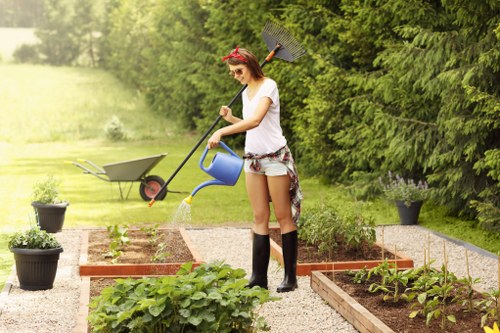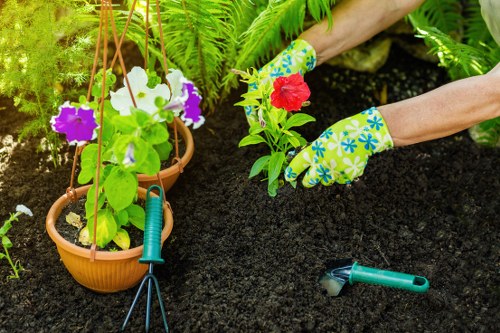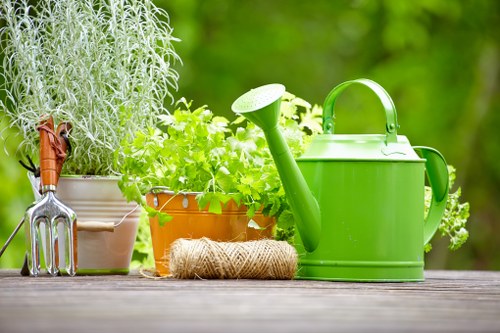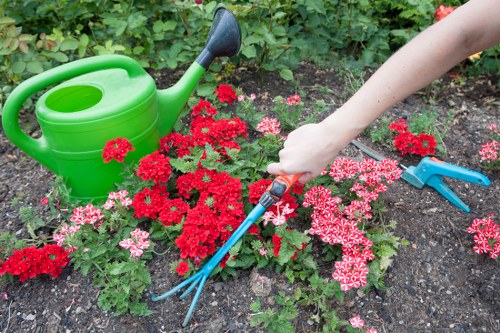Comprehensive Guide to Garden Fence Installation in Ealing

Installing a garden fence in Ealing not only enhances the beauty of your property but also provides necessary security and privacy. Whether you're looking to define your garden space, keep pets safe, or add a decorative element to your home, choosing the right fence is essential.
In Ealing, homeowners have a variety of fence options to choose from, including wood, metal, and composite materials. Each type offers unique benefits and can be customized to match your garden's aesthetic and functional needs.
Understanding the local regulations and obtaining the necessary permits is crucial before starting your garden fence installation. Ealing has specific guidelines to ensure that fences complement the area's architectural style and do not disrupt the neighborhood's harmony.
Benefits of Garden Fence Installation

Installing a garden fence in Ealing offers numerous benefits:
- Privacy: A fence provides a private space where you can relax without worrying about onlookers.
- Security: It helps keep unwanted visitors and stray animals out of your garden.
- Aesthetics: A well-chosen fence can significantly enhance the visual appeal of your property.
- Boundary Definition: Clearly marks the boundaries of your property, preventing disputes with neighbors.
- Safety for Children and Pets: Ensures that children and pets remain within the safe confines of your garden.
Additionally, a garden fence can increase your property's value by adding to its overall curb appeal and functionality.
Choosing the right material and design can make a significant difference in the long-term satisfaction with your fence. It's essential to consider factors like maintenance, durability, and weather resistance when making your decision.
Types of Garden Fences Available in Ealing

There are several types of garden fences available for installation in Ealing. Each type has its own set of advantages and can be selected based on your specific needs and preferences.
Wooden Fences
Wooden fences are a popular choice due to their natural appearance and versatility. They can be painted or stained to match your garden's color scheme and offer a traditional look that blends well with most garden styles.
**Advantages of Wooden Fences:**
- Natural and aesthetic appeal
- Customizable in terms of design and color
- Various styles available, such as picket, lattice, and panel
However, wooden fences require regular maintenance to prevent rot, warping, and damage from pests.
Metal Fences
Metal fences, including those made of wrought iron, aluminum, and steel, are known for their durability and strength. They are resistant to weather elements and require minimal maintenance compared to wooden fences.
**Advantages of Metal Fences:**
- Long-lasting and durable
- Low maintenance
- Stylish and modern appearance
Metal fences are ideal for those seeking a secure and low-maintenance option, though they can be more expensive initially.
Composite Fences
Composite fences are made from a combination of wood fibers and plastic, offering the look of wood without the associated maintenance. They are environmentally friendly and resistant to rot, insects, and moisture.
**Advantages of Composite Fences:**
- Eco-friendly materials
- Low maintenance
- Durable and long-lasting
While composite fences can be more costly than some other materials, their durability and low maintenance requirements make them a worthwhile investment.
Steps to Install a Garden Fence in Ealing

Installing a garden fence involves several critical steps to ensure a successful and lasting result. Here’s a step-by-step guide to help you through the process:
- Planning and Permits: Begin by checking Ealing's local regulations and obtaining any necessary permits for fence installation.
- Measuring and Marking: Accurately measure the area where the fence will be installed and mark the boundaries.
- Choosing the Fence Material: Select the type of fence that best suits your needs, considering factors like durability, maintenance, and aesthetics.
- Preparing the Site: Clear the installation area of any obstacles and ensure the ground is level.
- Installing Fence Posts: Dig holes for the fence posts and set them securely using concrete to ensure stability.
- Attaching Fence Panels: Once the posts are in place, attach the fence panels or rails according to the chosen design.
- Finishing Touches: Paint or stain the fence if necessary, and add any decorative elements to enhance its appearance.
Following these steps carefully will help you achieve a professional-looking garden fence that meets your needs and complies with local regulations.
It's advisable to seek professional assistance if you're unsure about any part of the installation process to avoid potential mistakes and ensure the fence's longevity.
Costs Associated with Garden Fence Installation in Ealing

The cost of installing a garden fence in Ealing can vary widely depending on several factors:
- Material: Different materials come with different price points. For example, wood is generally cheaper than metal or composite materials.
- Size of the Area: The total length and height of the fence will impact the overall cost.
- Design Complexity: Intricate designs and custom features can increase the cost.
- Labor Costs: Professional installation fees vary based on the contractor's experience and the project's complexity.
- Permits and Regulations: Costs associated with obtaining permits and ensuring compliance with local regulations.
On average, homeowners in Ealing can expect to pay between £50 and £150 per linear meter, depending on the materials and complexity of the installation. It's essential to obtain multiple quotes from reputable contractors to ensure you receive a fair price.
Investing in quality materials and professional installation can save you money in the long run by reducing maintenance costs and increasing the fence's lifespan.
Maintaining Your Garden Fence
Proper maintenance is key to ensuring the longevity and appearance of your garden fence in Ealing. Here are some maintenance tips:
Regular Inspection
Conduct regular inspections to identify any signs of damage, such as cracks, rot, or rust. Addressing these issues promptly can prevent them from worsening.
Cleaning
Keep the fence clean by removing dirt, debris, and any plant growth. For wooden fences, periodic washing and sanding may be necessary to maintain their appearance.
**For metal fences:**
- Remove rust using appropriate cleaning agents.
- Repaint or apply a protective coating to prevent future corrosion.
**For wooden fences:**
- Stain or paint annually to protect against weather elements.
- Replace any damaged boards or panels promptly.
**For composite fences:**
- Wash with soap and water to remove stains and prevent mold growth.
- Check for any loose or damaged sections and repair as needed.
Seasonal Maintenance
Perform seasonal maintenance tasks, such as applying sealants or paints during dry seasons and checking for winter damage after harsh weather. Taking these steps will help preserve your fence's integrity and appearance throughout the year.
Choosing the Right Contractor in Ealing
Selecting a reputable and experienced contractor is crucial for a successful garden fence installation. Here are some tips to help you choose the right professional in Ealing:
- Experience: Look for contractors with a proven track record in fence installation, especially in the Ealing area.
- References: Ask for references or reviews from previous clients to gauge the contractor's reliability and quality of work.
- Licensing and Insurance: Ensure the contractor is properly licensed and insured to protect yourself from any liabilities.
- Detailed Quotes: Obtain detailed quotes that outline the costs, materials, and timeline for the project.
- Communication: Choose a contractor who communicates effectively and understands your specific needs and preferences.
Taking the time to research and select the right contractor will ensure that your garden fence installation is completed to your satisfaction and meets all necessary standards.
Don't hesitate to ask questions and discuss your vision with potential contractors to ensure they can deliver the results you desire.
Local Regulations and Permits in Ealing
Before embarking on a garden fence installation in Ealing, it's essential to be aware of local regulations and obtain any necessary permits. These rules are in place to maintain the area's aesthetic and ensure safety.
Ealing Council Guidelines
The Ealing Council has specific guidelines regarding fence height, placement, and materials. Typically, residential fences should not exceed 2 meters in height without special permission. Additionally, fences should not obstruct public pathways or encroach on neighboring properties.
Permit Requirements
Depending on the type and size of the fence, you may need to apply for a planning permission. It's advisable to consult with the Council or a professional contractor to determine if your specific project requires a permit.
Failing to comply with local regulations can result in fines or the removal of the fence, so it's crucial to ensure all guidelines are followed from the outset.
Neighbor Considerations
Communicate with your neighbors about your fence plans to avoid any disputes. In some cases, sharing the cost of the fence may be possible if it will also benefit them.
Respecting these regulations and maintaining good relationships with neighbors will lead to a smoother installation process and a more harmonious neighborhood.
Eco-Friendly Garden Fencing Options
For environmentally conscious homeowners in Ealing, there are several eco-friendly garden fencing options available:
Bamboo Fences
Bamboo is a sustainable material that offers a unique and natural look. It's lightweight, durable, and resistant to pests, making it an excellent choice for eco-friendly fencing.
Recycled Materials
Fences made from recycled materials, such as reclaimed wood or recycled plastic, reduce environmental impact and promote sustainability. These options often require less maintenance and are highly durable.
Living Fences
Living fences, created using hedges or rows of plants, provide natural beauty and environmental benefits. They support local wildlife, improve air quality, and contribute to the overall ecosystem.
Choosing an eco-friendly fence not only benefits the environment but also adds unique character to your garden.
Enhancing Curb Appeal with Garden Fences
A well-designed garden fence can significantly enhance your property's curb appeal. Here are some tips to consider:
Choosing the Right Style
Select a fence style that complements your home's architecture and the surrounding landscape. For example, a classic wooden picket fence works well with traditional homes, while a sleek metal fence suits modern properties.
Color Coordination
Coordinate the fence color with your home's exterior, roof, and garden elements. Neutral tones can create a harmonious look, while bold colors can make a statement.
Adding Decorative Elements
Incorporate decorative features such as lattice panels, finials, or ornamental post caps to add visual interest and enhance the fence's overall appearance.
By thoughtfully designing your garden fence, you can create a welcoming and attractive entrance that boosts your home's overall appeal.
Lighting
Integrate lighting into your fence design to highlight architectural features and provide safety during nighttime. Solar-powered lights are an eco-friendly option that adds both functionality and beauty.
Local Plant Considerations for Living Fences
If you opt for a living fence in Ealing, it's important to choose plants that thrive in the local climate and soil conditions:
- Boxwood: A classic choice for hedges, boxwood is versatile and can be shaped to create formal or informal designs.
- Privet: Privet grows quickly and forms a dense barrier, making it ideal for privacy fencing.
- Holly: Holly provides year-round greenery and attractive berries, adding both beauty and functionality.
- Laurel: With its thick foliage, laurel is excellent for creating a solid, impenetrable barrier.
- Bamboo: As mentioned earlier, bamboo is a sustainable and visually appealing option for living fences.
Selecting the right plants ensures that your living fence remains healthy and aesthetically pleasing for years to come.
Consulting with a local nursery or horticulturist can provide additional guidance on the best plant species for your specific garden conditions.
Weather Impact on Garden Fences in Ealing
Ealing experiences a temperate climate with varying weather conditions throughout the year. Understanding how different weather elements can affect your garden fence is essential for its longevity:
Rain and Moisture
Rain and moisture can cause wooden fences to rot and metal fences to rust if not properly maintained. Ensuring proper drainage and using weather-resistant materials can mitigate these effects.
Sun Exposure
Prolonged sun exposure can fade colors and weaken materials over time. Applying UV-resistant coatings and choosing materials that withstand sun exposure can help maintain your fence's appearance.
Wind
High winds can put stress on fence structures, especially taller fences. Using strong materials and secure installation techniques will help your fence withstand windy conditions.
Frost and Temperature Fluctuations
Temperature changes can cause materials to expand and contract, leading to cracks or warping. Selecting flexible and durable materials can reduce the risk of damage from temperature fluctuations.
Regular maintenance and timely repairs are key to protecting your garden fence from the adverse effects of weather.
10-15 Areas Near Ealing for Garden Fence Installation
Ealing is surrounded by several neighborhoods that share similar requirements and aesthetic preferences for garden fence installations. Here are some of the closest areas to Ealing:
- Acton Located just north of Ealing, Acton offers a mix of residential and commercial areas, making garden fencing a popular choice for defining private spaces.
- Greenford West of Ealing, Greenford is known for its family-friendly environment, where secure and attractive fences are essential for homes with children and pets.
- Hanwell Adjacent to Ealing, Hanwell features historic homes where traditional wooden fences often complement the area's architectural styles.
- Northolt Northolt's diverse community and green spaces make a variety of fence types desirable to match different property styles.
- Perivale Close to Ealing, Perivale residents often seek modern and low-maintenance fencing solutions to suit their contemporary homes.
- Walton-on-the-Lea: Situated southwest of Ealing, this area favors elegant and sturdy fences that enhance the area's upscale residences.
- Isleworth East of Ealing, Isleworth combines urban and suburban elements, with garden fences playing a role in both privacy and boundary marking.
- Camberwell A short distance from Ealing, Camberwell's residential areas benefit from aesthetically pleasing fences that add to the neighborhood's charm.
- Southall Known for its cultural diversity, Southall embraces a variety of fence designs and materials to reflect its vibrant community.
- Hanger Hill: Featuring green spaces and parks, Hanger Hill residents often prefer eco-friendly and visually appealing fencing options.
- Chiswick Although slightly farther, Chiswick's proximity to Ealing makes it a relevant area for garden fence installations, with a focus on stylish and functional designs.
- Parson's Green: Nestled near Ealing, Parson's Green emphasizes harmonious fence designs that blend seamlessly with the local environment.
- Park Royal: With its mix of residential and industrial zones, Park Royal requires versatile fencing solutions to cater to different property needs.
- Perivale: Close to Ealing, Perivale residents often seek modern and low-maintenance fencing solutions to suit their contemporary homes.
- North Ealing: Directly adjacent to Ealing, North Ealing shares similar fencing needs, focusing on both privacy and aesthetic integration.
Each of these areas has unique characteristics that influence the choice of garden fencing, from traditional wooden styles to modern metal designs, ensuring that homeowners can find the perfect fit for their specific requirements.
Choosing the Right Fence Height
The height of your garden fence plays a crucial role in its functionality and compliance with local regulations in Ealing. Here are some considerations:
Privacy
If privacy is your primary concern, opting for a taller fence, typically around 1.8 meters, is advisable. This height prevents outsiders from viewing into your garden, creating a secluded and secure space.
Security
For enhanced security, a taller and sturdier fence can deter potential intruders and keep pets safely contained within your property.
Local Regulations
As mentioned earlier, Ealing Council has guidelines regarding fence heights. Residential fences generally should not exceed 2 meters without special permission. It's essential to adhere to these regulations to avoid any legal issues.
Neighbor Considerations
Discussing fence height with your neighbors can help maintain good relationships and ensure that the fence complements both properties. Mutual agreement on height can prevent disputes and promote harmony in the neighborhood.
By carefully selecting the appropriate fence height, you can achieve the desired level of privacy and security while complying with local guidelines.
Innovative Fence Designs for Modern Gardens
Modern garden designs offer innovative fencing options that combine functionality with artistic expression. Here are some trending designs in Ealing:
Picket Fences with a Twist
Traditional picket fences are being reinvented with unique patterns, asymmetrical designs, and varied heights to add visual interest and a contemporary feel to gardens.
Vertical Gardens
Incorporating vertical gardens into your fence design allows plants to grow along the fence, creating a lush and green barrier that enhances both beauty and air quality.
Mixed Material Fences
Combining different materials, such as wood and metal, can create a striking contrast and add depth to your garden's appearance. This approach offers versatility and a modern aesthetic.
Glass Panels
For a sleek and transparent look, glass panels can be integrated into metal or wooden fences. This design provides security without compromising on light and openness.
Adopting these innovative designs can transform your garden fence into a standout feature, reflecting your personal style and enhancing your outdoor space.
Sustainable Practices in Fence Installation
Embracing sustainable practices during garden fence installation helps reduce environmental impact and promotes eco-friendly living. Here are some approaches:
Using Recycled Materials
Opting for fences made from recycled materials, such as reclaimed wood or recycled metal, minimizes waste and supports sustainable resource management.
Eco-Friendly Finishes
Choose non-toxic and environmentally friendly finishes, paints, or stains to protect your fence without harming the environment.
Energy Efficient Techniques
Incorporate energy-efficient installation techniques, such as using solar-powered lighting or insulating the fence structure, to enhance sustainability.
Implementing these sustainable practices ensures that your garden fence installation contributes positively to the environment and aligns with eco-conscious values.
Consulting with contractors who prioritize sustainability can further enhance the eco-friendliness of your fence project.
Impact of Garden Fences on Property Value
A well-installed garden fence can significantly impact your property's value in Ealing. Here's how:
Increased Curb Appeal
An attractive and well-maintained fence enhances the overall appearance of your property, making it more appealing to potential buyers.
Functional Benefits
Features like privacy, security, and defined boundaries add functional benefits that are highly valued by homeowners, increasing the property's desirability.
Investment in Quality
Investing in high-quality materials and professional installation ensures that the fence remains in excellent condition over time, reflecting positively on the property's maintenance and value.
Overall, a garden fence is a worthwhile investment that not only serves practical purposes but also contributes to the long-term value and aesthetic appeal of your home.
Conclusion
Installing a garden fence in Ealing is a significant decision that involves careful planning, material selection, and adherence to local regulations. By understanding the various types of fences, their benefits, and the installation process, you can make an informed choice that enhances your property's beauty, security, and value.
Whether you opt for a traditional wooden fence, a modern metal design, or an eco-friendly living fence, ensuring quality installation and regular maintenance will provide lasting satisfaction.
Consider consulting with experienced local contractors and exploring innovative and sustainable options to create a garden fence that perfectly suits your needs and complements the Ealing neighborhood.
Frequently Asked Questions
- 1. How long does it take to install a garden fence in Ealing?
The installation time varies based on the fence type, length, and complexity. On average, a typical garden fence installation can take anywhere from a few days to a couple of weeks.
- 2. Do I need a permit to install a garden fence in Ealing?
Depending on the fence's height and location, you may require a permit from the Ealing Council. It's recommended to consult with local authorities or a professional contractor to determine the specific requirements for your project.
- 3. What is the most durable fencing material for Ealing's climate?
Metal and composite materials are highly durable and resistant to Ealing's weather conditions. They require minimal maintenance and can withstand rain, wind, and temperature fluctuations effectively.
- 4. Can I install a garden fence myself, or should I hire a professional?
While DIY installation is possible for those with the necessary skills and tools, hiring a professional ensures that the fence is installed correctly and complies with local regulations. Professionals also provide warranties and can handle any unexpected challenges during installation.
- 5. How can I maintain my garden fence to ensure its longevity?
Regular maintenance, such as cleaning, inspecting for damage, and applying protective coatings or finishes, is essential. The specific maintenance tasks depend on the fence material, but generally, addressing issues promptly and keeping the fence clean will extend its lifespan.